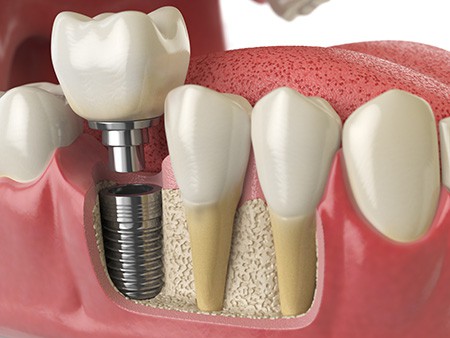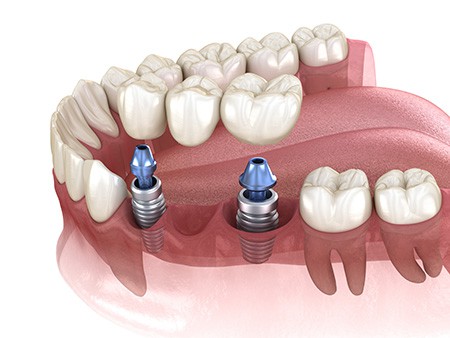Full Mouth Reconstruction In Toledo & Sylvania
At Our Dental Office in Sylvania

At Dental Health Associates, we have experience treating even the most complex needs of our patients. Some of our patients have lost or damaged all (or nearly all) of their teeth and need a treatment known as full mouth reconstruction. This term describes the process of replacing or rebuilding all of the teeth in the upper and lower jaws through a combination of restorative dentistry treatments.
Who Needs Full Mouth Reconstruction?
Individuals that may need full mouth reconstruction have:
- Severely injured or fractured teeth
- Severely worn teeth
- Missing teeth due to dental disease, decay or trauma
- Problems with the bite that are causing jaw, muscle or head pain
The Treatment Process

Prior to beginning any treatment, our team meets with every patient on a one-on-one basis to discuss the patient’s specific needs and goals of treatment. A thorough examination is performed to identify the areas of concern, and a comprehensive, step-by-step treatment plan is discussed.
Based on the patient, the treatment plan may include any combination of the following:
- Dental crowns to cover and protect fractured or broken teeth
- Dental implants to permanently replace missing teeth
- Dental bridges to close gaps left by missing teeth
- Periodontal treatment to treat excessive or insufficient gum tissue
- Orthodontic treatment to correct problems with the bite
Depending on the extent of the treatment plan, these services may be performed in separate stages, or combined into a single appointment.
Preparing for Full Mouth Reconstruction

Full mouth reconstructions are typically performed in stages, starting with an in-depth evaluation of your teeth, gums, and jaw. Our experienced dentists take X-rays to examine deeper oral health issues and bone integrity, then formulate a step-by-step plan. Preparation for your FMR depends on your unique treatment plan. Patients getting dental implants, bridges, or dental crowns may want to treat themselves to their favorite chewy meal before their appointment because these procedures require a soft-food diet afterward.
Read about your dental procedures and ask questions during your consultation to ensure you know what to expect after full mouth reconstruction. These details help you prepare mentally for the process ahead.
What to Expect After Full Mouth Reconstruction
FMR recovery is unique to your treatment plan and may involve weeks or months of healing between procedures. Invasive dental work is spaced out to give your oral tissues and jaw time to heal, and the scheduling of these procedures relies on your recovery. Younger patients may improve faster than older patients or those with medical conditions such as diabetes.
You may be limited to soft foods to prevent damaging the dental work. Swelling, tooth sensitivity, and discomfort are common after dental implants, bridges, and other extensive restorative work. Our dentists may prescribe antibiotics and short-term pain medicines to help your mouth heal after full mouth reconstruction. The surgical site can be tender, and you may need to brush and floss gently while your gums and teeth adjust.
Warm saltwater rinses can reduce pain and inflammation. Your speech may be affected for a few days, but your mouth will quickly adapt to your new bite.
Cost of Full Mouth Reconstruction
The price of full mouth reconstruction is unique to each patient; the total amount depends on the extent of treatment and severity of dental issues. Our dentists will provide a detailed treatment plan and a personalized price estimate after your dental exam and consultation. Dental Health Associates of Sylvania offers various financing options, such as CareCredit™, and an in-house savings plan so patients can restore a healthy, beautiful smile while sticking to their budget.
While full mouth reconstruction is one of the more expensive restorative dentistry options, it is a worthy investment when you consider the long-term costs of restorative procedures spaced years apart and dental issues that may worsen in the meantime.
Full Mouth Reconstruction FAQs
How long does full mouth reconstruction last?
The full mouth reconstruction process may take several weeks, months, or up to a year, based on your unique plan and dental needs.
Full mouth reconstruction results should lay the foundation for a lifetime of improved oral health, though some restorations, such as dental crowns, may need replacing after 10 to 15 years. You can enjoy your newly restored smile for one to two decades or longer with good oral hygiene and bi-annual dental exams and teeth cleanings.
What limitations will I have after full mouth reconstruction?
After dental treatment, the affected teeth will be more sensitive to cold and hot temperatures, and your bite will change. You should avoid hard, chewy foods until your mouth has healed, but continue to stay away from foods that can crack or chip your restorations. Don’t use your teeth as tools to open packages and stop yourself from chewing on your fingernails or pencils. Generally, you should not eat beer nuts, peanut brittle, ice, and other hard foods to avoid harming your natural teeth and restorations.
How do I care for my new smile after full mouth reconstruction?

Your new smile may need special care if you have a dental bridge with connected artificial teeth over an empty tooth socket. The tissues under dental bridges need cleaning with floss threaders and similar products to prevent bacteria from building up under the artificial teeth. Other dental restorations require regular oral hygiene, including brushing with fluoridated toothpaste twice daily, flossing daily, and rinsing with a quality mouthwash. Use a custom mouthguard for contact sports and a night guard if you struggle with bruxism (teeth grinding).
Is full mouth reconstruction the same as a smile makeover?
These procedures offer customizable treatment plans to improve your smile, but they are performed for different reasons. Smile makeover is an option for patients looking to address cosmetic imperfections, such as tooth gaps, chipped or cracked teeth, and a gummy smile. Full mouth restoration is designed to improve your oral health and function. Another critical difference is the insurance coverage; a smile makeover is an elective process not covered by dental plans, but full mouth reconstruction is covered because it is medically necessary to address severe oral health concerns.
Contact Dental Health Associates
For more information about full mouth reconstruction, please contact the team at Dental Health Associates and request a consultation.


